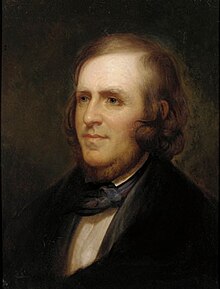Franklin Peale
| Franklin Peale | |
|---|---|
 |
|
| 3rd Chief Coiner of the United States Mint at Philadelphia | |
|
In office March 27, 1839 – December 2, 1854 |
|
| President | |
| Preceded by | Adam Eckfeldt |
| Succeeded by | George K. Childs |
| 2nd Melter and Refiner of the United States Mint at Philadelphia | |
|
In office January 5, 1836 – March 27, 1839 |
|
| President | |
| Preceded by | Joseph Cloud |
| Succeeded by | |
| Personal details | |
| Born |
Aldrovand Peale October 15, 1795 Philadelphia, Pennsylvania |
| Died | May 5, 1870 (aged 74) Philadelphia, Pennsylvania |
| Resting place | Laurel Hill Cemetery, Philadelphia |
| Nationality | American |
| Spouse(s) |
|
| Children | Anna Elizabeth (by Eliza Peale) |
| Alma mater | University of Pennsylvania |
| Signature | |
Benjamin Franklin Peale (born Aldrovand Peale; October 15, 1795 – May 5, 1870), usually Franklin Peale, was an employee and officer of the Philadelphia Mint from 1833 to 1854. Although Peale introduced many innovations to the Mint of the United States, he was eventually dismissed amid allegations he had used his position for personal gain.
Peale was the son of painter Charles Willson Peale, and was born in the museum of curiosities that his father ran in Philadelphia. For the most part, Franklin Peale's education was informal, though he took some classes at the University of Pennsylvania. He became adept in machine making. In 1820, he became an assistant to his father at the museum, and managed it after Charles Peale's death in 1827.
In 1833, Peale was hired by the Mint, and was sent for two years to Europe to study and report back on coining techniques. He returned with plans for improvement, and designed the first steam-powered coinage press in the United States, installed in 1836. Peale was made Melter and Refiner of the Philadelphia Mint that year, and Chief Coiner three years later upon the retirement of the incumbent, Adam Eckfeldt, who continued in his work without pay. Eckfeldt's labor allowed Peale to run a medal business using Mint property. This sideline eventually caused Peale's downfall: conflicts with Engraver James B. Longacre and Melter and Refiner Richard Sears McCulloh led to Peale being accused of misconduct, and he was dismissed by President Franklin Pierce in 1854.
In retirement, Peale continued his involvement in and leadership of many civic organizations; he died in 1870. Numismatic author Q. David Bowers suggests that the facts of Peale's career allow writers to draw very different conclusions about him.
Benjamin Franklin Peale was born October 15, 1795, to painter Charles Willson Peale and his second wife, the former Elizabeth de Peyster. As well as pursuing his art, Charles Peale ran a museum of curiosities housed in Philosophical Hall in Philadelphia, home of the American Philosophical Society. The boy was born in the family quarters in the museum. He was given the name Aldrovand, after the Italian naturalist Ulisse Aldrovandi.
...
Wikipedia
